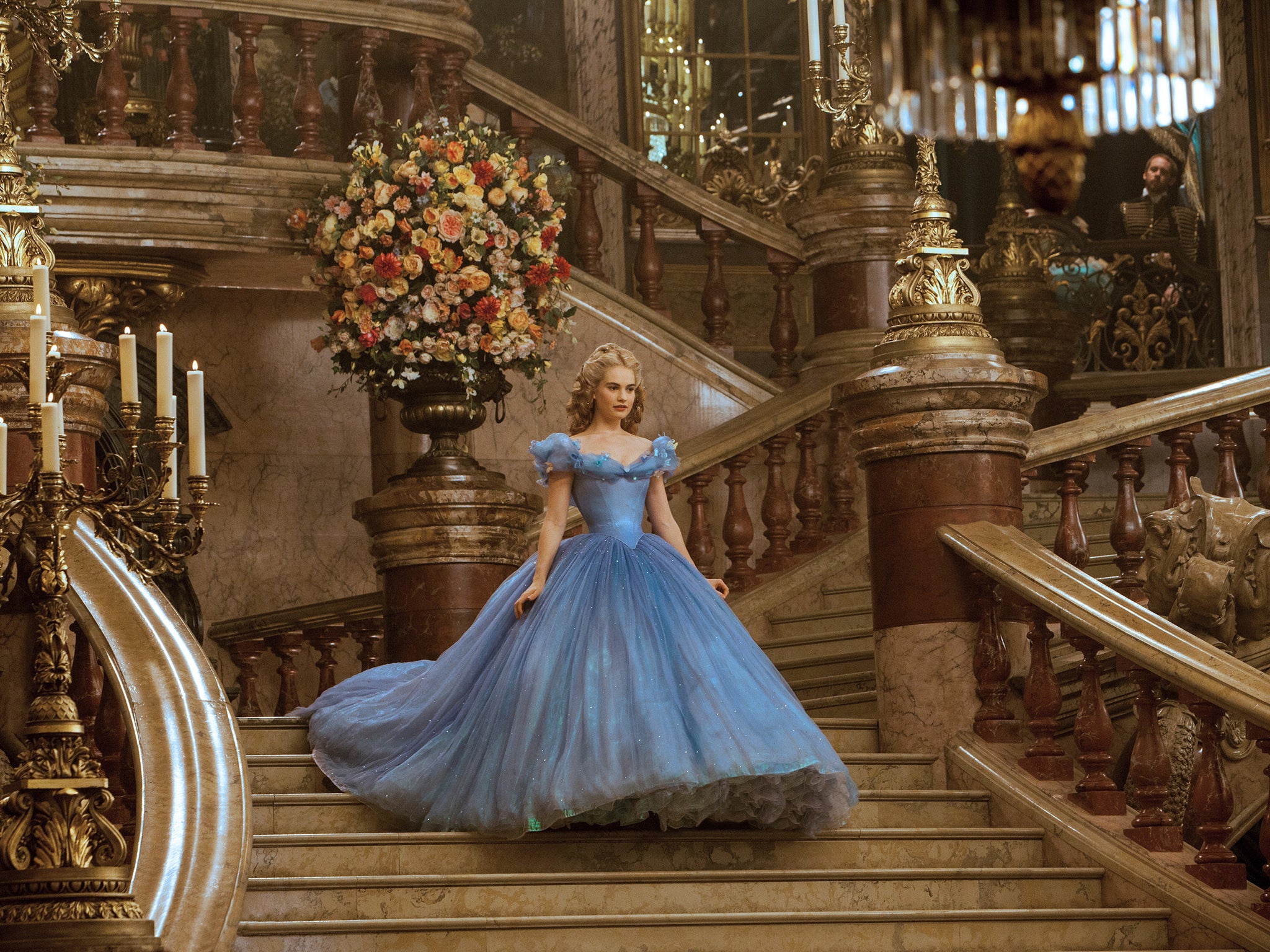Disney's mega money-making formula: 'Human' remakes of cartoon classics are part of a lucrative, long-term creative plan
Cinderella, Disney's latest live-action remake, opens in the UK today – and other lavish adaptations are on the way

In these days of Hunger Games, Avengers and 50 Shades of Grey, it may seem improbable that a traditional family fairy tale should top the US box office charts. But that's what happened earlier this month, when Kenneth Branagh's $95m (£64m) live-action remake of Cinderella arrived in American cinemas, almost 65 years to the day since the release of the Disney animated classic.
The new film, starring Lily James as Cinders and Cate Blanchett as her evil stepmother, has also spent two weeks at No 1 in China, the world's second biggest film market. Today, it opens across the UK, where it will doubtless continue to thrive, validating Disney's latest lucrative, long-term creative plan: to dust off its back catalogue of beloved animated films – the foundation on which the studio was first built – and turn them into modern CGI spectaculars.
It's an idea Disney first floated to good effect in 1996, with its live-action remake of 101 Dalmatians, starring Glenn Close as the dastardly Cruella de Vil. But it was the unexpected and staggering success of Tim Burton's Alice in Wonderland in 2010 that persuaded the House of Mouse to pursue its slate of remakes with the same enthusiasm as a major superhero franchise.
Burton's film broke the $1bn barrier at the worldwide box office, a rare feat achieved by fewer than 20 films in all of cinema history. In 2013, though, it was surpassed by Disney 's mega-hit, Frozen, the most successful animated film ever. Though Frozen was an original story, and indeed a cartoon, it proved the fairy-tale genre could still find a vast audience.
Last year, Maleficent, with Angelina Jolie as the iconic villainess of 1959's Sleeping Beauty, grossed $758m despite middling reviews – and there's plenty more where that came from. In 2016, Disney will release its remake of The Jungle Book, with an all-star cast including Bill Murray, Scarlett Johansson and Idris Elba, as well as the Alice sequel, Through the Looking Glass. They'll be followed in 2017 by Beauty and the Beast, with Emma Watson and Dan Stevens in the title roles; and then, probably in 2018, by Burton's latest project: a live-action remake of Dumbo.
Like Star Wars and the Marvel superhero universe, both of which the studio acquired in recent years for a bargain $4bn apiece, Disney's animated family classics provide a galaxy of familiar characters to revisit and introduce to a younger generation
"It makes perfect sense for Disney to sift through their vault and repurpose, reimagine and retool the classic tales that audiences know and love," says film industry expert Paul Dergarabedian, of Rentrak, which measures trends in the entertainment business.
"Maleficent and Cinderella prove that there is a huge appetite for these stories as realised in a live-action context. If this strategy enjoys continued success [which seems assured at this point], Disney could enjoy fairy-tale results that are as dynamic and profitable for the long term as any of the Marvel superheroes, Pixar characters and Star Wars brands within their stable of properties."
Disney's slate is the envy of Hollywood, with several other studios attempting to emulate its winning strategy. Universal, for instance, plans to reboot its classic monster titles in an interconnected universe inhabited by the likes of Dracula and Frankenstein. Warner Brothers intends to squeeze several more films out of the Harry Potter franchise.

Watch Apple TV+ free for 7 days
New subscribers only. £8.99/mo. after free trial. Plan auto-renews until cancelled

Watch Apple TV+ free for 7 days
New subscribers only. £8.99/mo. after free trial. Plan auto-renews until cancelled
But with fairy tales, as with superheroes, Disney dominates. Universal tried a new take on Snow White, with 2012's Snow White and the Huntsman, which earned a respectable $400m, but the following year, Hansel and Gretel: Witch Hunters and Jack the Giant Slayer (director Bryan Singer's take on Jack and the Beanstalk) both turned out to be turkeys.
"Those movies felt they needed to shake things up a little bit and take a darker approach to the material," says Phil Contrino, chief analyst at Boxoffice.com. "But these are stories that have worked for a very long time and will continue to work. They have universal elements that you don't have to play around with very much. The audience that loves these stories will always love them."
Disney, mindful of producing a movie that would have wide appeal without alienating young girls and their mothers, reportedly let go Cinderella's original director, Mark Romanek, who wanted to take the story in a darker direction rather than stick to a family-friendly formula. And in the US, Disney also showed a new Frozen short before screenings of Cinderella.
"That's another example of how well Disney knows its audience," Contrino says. "Tell a little girl you're going to see Cinderella and there's a Frozen short movie in front of it, and just watch their eyes light up. It's a perfect pairing. We're going to see a new trailer for Star Wars in front of the new Avengers sequel, too. The cross-promotion of which Disney is capable is staggering. They're going to dominate the global box office for the next five to 10 years."
After executives announced plans for a sequel to Frozen at the company's annual shareholder meeting this month, Disney shares skyrocketed. Of course, the classic fairy tales may not lend themselves to sequels and spin-offs quite so easily as do superheroes or Star Wars. But then, why would Disney need sequels, when it already has theme parks?
Subscribe to Independent Premium to bookmark this article
Want to bookmark your favourite articles and stories to read or reference later? Start your Independent Premium subscription today.

Join our commenting forum
Join thought-provoking conversations, follow other Independent readers and see their replies